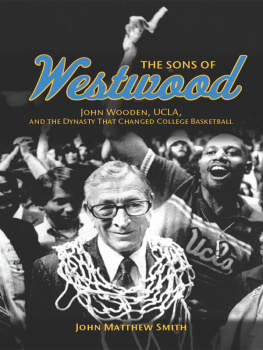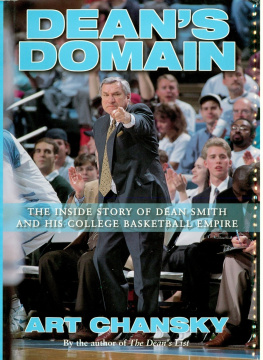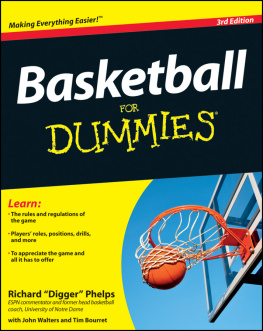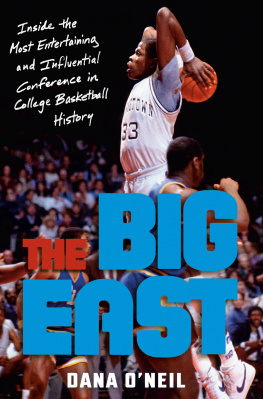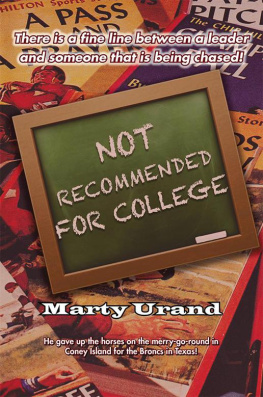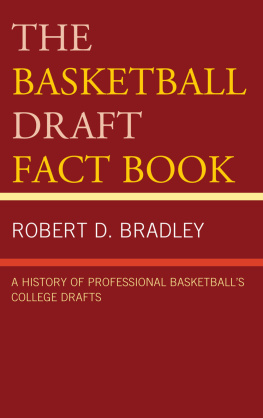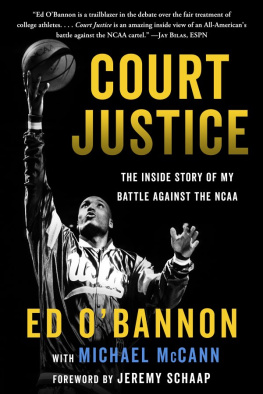Acknowledgments
This book, and my career as a historian, has been shaped and influenced by great teachers. Looking back, my interest in John Wooden began when I was an undergraduate, studying to become a teacher myself. As a lifelong basketball fan and aspiring teacher, I turned to Coach Wooden's little blue book of wisdom, Wooden: A Lifetime of Observations and Reflections On and Off the Court. I took copious notes on everything Wooden wrote about teaching, coaching, and self-improvement. I did not know it at the time, but reading Wooden's maxims stuck with me; they became part of how I saw myself as a student and as a teacher. I never had the chance to meet Coach Wooden, but I hope that my book tells his life story in a way that he would appreciate.
I did not know that I would become a historian until I met Pero Dagbovie at Michigan State University. He showed me that I could write about the two subjects I love most: history and sports. I will never forget how he encouraged me to always do my best. Lucky for me, he was the best professor I ever had at MSU. At Western Michigan University, Mitch Kachun's mentorship helped me develop into a professional historian. Mitch always showed great enthusiasm for my work and took a genuine interest in me as a student and as a person. Thanks, Mitch.
I owe a special debt of thanks to Randy Roberts, my major professor at Purdue University. In every way, Randy has influenced how I see myself as a historian. More than anyone else, Randy helped me conceptualize the book, shape its outline, and refine the writing. My name may be on the cover of the book, but Randy's imprint is on every page. I am forever grateful for what Randy taught me, but most of all, I am thankful for his friendship and the generosity he and his wife, Marjie, have shown me.
I am especially grateful to Aram Goudsouzian. In addition to advising about a dozen graduate students of his own at the University of Memphis, Aram became a mentor to me as well. His outstanding biography of Bill Russell influenced my entire vision of this project. Aram pushed me to become a better writer and a more thoughtful historian. Thanks for your encouragement and friendship, Aram.
My professors and fellow graduate students in the Department of History at Purdue University offered tremendous professional and personal support. Professors Darren Dochuk, Nancy Gabin, and Jim Farr challenged me in graduate seminars and in the writing of my dissertation. Ron Johnson and I set numerous records for three-hour lunches discussing our projects. Ron's genuine enthusiasm for my work energized me throughout the writing process. Eric Hall read every chapter of the dissertation, offering suggestions that helped me clarify my ideas and improve the writing. In the process of revising the dissertation into a manuscript, Andrew Smith provided constructive criticisms of many chapters. In support of my project, a Woodman Travel Grant from the Purdue Department of History helped finance a research trip to UCLA. The Purdue Research Foundation funded me for a summer, and the Purdue Graduate School generously provided financial support for an entire year with the Winifred Beatrice Bilsland Dissertation Fellowship.
Throughout the research process, many people offered their time and assistance. At UCLA, archivists Charlotte Brown and Monique Sugimoto helped me locate critical documents and answered numerous questions about the history of UCLA. At the UCLA Special Collections, Simon Elliott worked with me to select many of the photographs for the book. The UCLA Special Collections also provided copies of oral histories. Anyone who writes about the history of American sports should visit the University of Notre Dame's Special Collections. Curator George Rugg offered invaluable assistance there, helping me find old basketball magazines, game programs, and media guides. Indiana State University archivist Susan Davis sent me a stack of news clippings related to John Wooden's early coaching career. Kevin Walker, the son of Indiana State player Clarence Walker, generously shared his father's diary with me. Lisa Greer Douglass and Ellen Summers were especially helpful at the National Collegiate Athletic Association in Indianapolis. The Interlibrary Loan Department at Purdue University handled my requests with incredible efficiency and kindness.
The most enjoyable aspect of writing this book was conducting interviews with former UCLA players. Deep thanks to everyone who agreed to talk with me, especially Kenny Booker, Dwight Chapin, Denny Crum, John Ecker, Eddie Einhorn, Keith Erickson, Larry Farmer, Ronald Gallimore, Gail Goodrich, Larry Gower, John Green, Jaleesa Hazzard, Ken Heitz, Andy Hill, Les Hunter, Ronald Lawson Jr., Swen Nater, Lynn Shackelford, Bill Sweek, John Vallely, Perry Wallace, and Charles Young.
I am thankful for the incredible support of my editor, Willis G. Regier, Tad Ringo, and the entire staff at the University of Illinois Press. Sam Walker and David Wiggins read the manuscript for UIP and offered insightful suggestions that helped me revise the book. I also want to thank my copy editor, Annette Wenda, whose attention to detail and care for the language helped me make the book considerably better.
I am fortunate to have a wonderful group of friends whose endless encouragement helped me succeed. I am especially grateful for my friendship with Ryan Doyle, who is looking forward to the day when I write a book about his life. Brandon Fleming's friendship has rewarded me with countless memories of good times. Brandon made my first trip to UCLA a memorable one. Sorry about the Angels game, Brandon. For all of my friends who listened to me talk about John Wooden and UCLA and pledged to read my book, I thank you.
The love and support of my entire family have sustained me throughout my academic journey and the completion of this book. I am especially thankful for Ed Arriola's endless encouragement and support throughout the writing process. When my brother, Paul Smith, learned I was writing a book, he asked me if there would be pictures. Yes, Paul, there are pictures. I hope you like them. I am especially thankful for my sister, McKenna St. Onge, who always listened to my latest idea and let me read passages to her over the phone. Thanks for everything, McKenna.
My parents deserve more credit than anyone else for what I have accomplished. My father, Jay Smith, is the greatest man I know. When it comes to work ethic, kindness, and generosity, my dad is the gold standard. My mother, Kim St. Onge, made me believe that I had something important to say. Thanks for listening, Mom. You continue to inspire me.
JOHN MATTHEW SMITH is an assistant professor of history at Georgia Tech.
Sport and Society
A Sporting Time: New York City and the Rise of Modern Athletics, 182070 Melvin L. Adelman
Sandlot Seasons: Sport in Black Pittsburgh Rob Ruck
West Ham United: The Making of a Football Club Charles Korr
Beyond the Ring: The Role of Boxing in American Society Jeffrey T. Sammons
John L. Sullivan and His America Michael T. Isenberg
Television and National Sport: The United States and Britain Joan M. Chandler
The Creation of American Team Sports: Baseball and Cricket, 183872 George B. Kirsch
City Games: The Evolution of American Urban Society and the Rise of Sports Steven A. Riess
The Brawn Drain: Foreign Student-Athletes in American Universities John Bale
The Business of Professional Sports Edited by Paul D. Staudohar and James A. Mangan
Fritz Pollard: Pioneer in Racial Advancement John M. Carroll
A View from the Bench: The Story of an Ordinary Player on a Big-Time Football Team (formerly Go Big Red! The Story of a Nebraska Football Player)

